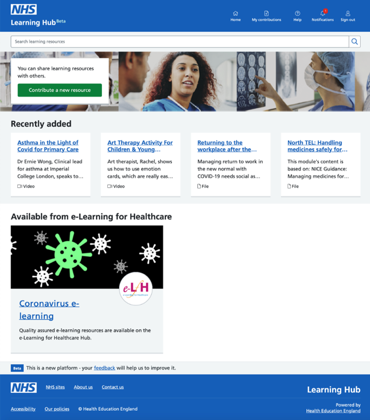Key Messages and links to 10th June 2020
Welcome to Health Education England’s weekly COVID-19 stakeholder bulletin.
HEE is working with partners to support the system-wide response to COVID-19. Our priority is to ensure trainees and learners are kept informed of immediate changes to their training and recruitment, as well as to support returners to the NHS.
In this bulletin we will provide:
- Weekly message from Interim Chief Executive, Professor Wendy Reid
- Overview of HEE and our partner’s national response to COVID-19
- An update from your regional office
Weekly message from Interim Chief Executive, Professor Wendy Reid –
In this week’s message we focus on exploring the impact that the current pandemic has, and continues to have, on vulnerable populations and on wellness and healthy living. Read the full message here.
We are supporting all professions to rapidly grow to meet the needs of patients by:
Medical rotations webinar
We held a webinar on 26 May on medical rotations for trainees. The webinar was hosted by Prof. Sheona MacLeod, Prof. Adrian Brooke and Prof. Simon Gregory. The recording of this webinar has now been uploaded to our YouTube channel.
National nursing team shares student midwife case study
This week we shared the story of student midwife Alicia Shirley Burnett from the University of West London. She tells us how it felt to have to opt out of the extended placement when a family member was shielding, why she started a blog for midwifery students and what she’s learning about leadership and teamwork during COVID-19.
Alicia says: “Whether you opted in or out you’re still a student midwife. You’re not alone. Know who your sources of support are and how to access them. It’s okay to ask for support; it doesn’t make you weak, in fact, it’s pretty wise.”
Read the case study or view her video clip on Twitter
Impact of COVID-19 on students survey – On Monday 1 June, HEE launched the Impact of COVID-19 on Students Survey (ICONS), which will remain open for four weeks. The survey will help HEE understand the experience of medical, dental, nursing, allied health professional (AHP) and healthcare science learners, whether they have stepped into clinical practice, into new environments to support frontline clinical services or have opted to continue with their academic studies.
The survey will focus on the support provided to learners during the pandemic key areas, such as induction, clinical supervision, and academic supervision. Importantly, the survey will provide an opportunity to hear from healthcare learners currently working or studying and will inform our approach to supporting these learners now and in the future.
If you have any general queries about the survey, please contact Quality@hee.nhs.uk.
We are ensuring core HEE work to support our NHS colleagues continues:
Increasing training places for NHS Clinical Psychologists and Child and Adolescent Psychotherapists – HEE has recently announced plans to expand the number of training places for NHS Clinical Psychologists and Child and Adolescent Psychotherapists, from September 2020. During 2020/21, HEE also intends to increase the education and training commissions for both professional roles by 25% nationally (an increase of 140). The roles will contribute to the design, leadership, research, development, supervision, and delivery of psychological and psychotherapeutic care and treatment, for people of all ages.
We are making sure all professions have the training they need to make a difference:
elearning for healthcare – The elfh COVID-19 programme has now been launched more than 1.4 million times since it was launched in mid-March 2020.
Recent additions to the programme include:
- A new learning path called “Physical Healthcare for Staff in Mental Health Settings” which includes the following content:
-
- Health and Social Care Interventions: Children and Young People
- Health and Social Care Interventions: Adults
- Learning Disabilities and Physical Health.
- A second learning path for staff working in primary care and community settings called “Supporting Patient Mental Health for the whole workforce” is now available. The learning path includes resources for those supporting adults and children with learning disabilities.
- A learning path aimed at nurses, midwives and AHPs – but is also relevant for other members of the workforce with a supervisory role. The “Support for Supervisors” learning path includes resources to guide supervisors on how to provide effective feedback and support those who are being supervised.
- A learning path to support student nurses undertaking a general practice placement as part of the COVID-19 response.
- An ICU quick reference guide.
For more information about the programme select here.
NHS Test and Trace – Colleagues at Public Health England working on the recently launched NHS Test and Trace service asked elfh to host the training resources for the staff working on the app. Due to the scale and pace of its roll out the usage on the programme has been incredible. Since the programme went live on 14 May 2020 there have been 1.34 million session launches.
elfh usage – Due to usage of the COVID-19 and Test and Trace programmes and an increase in usage on programmes including Care Certificate and End of Life Care, elfh has seen a new record number of session launches during one month. During May 2020 there were 2,491,975 session launches.
Learning Hub live – Since HEE’s Technology Enhanced Learning (TEL) team released the Learning Hub at the end of May 2020, over 500 resources have been contributed by the health and care workforce – many in response to the COVID-19 efforts to support the sector.
The Learning Hub is a new digital platform that provides easy access to a wide range of learning resources including videos, webinars, slide presentations, Q&A packs, simulation scripts, lesson plans and web links to support system readiness, recovery and beyond. New features will be frequently released to provide a comprehensive learning experience for users.
Many stakeholders from across the health and care workforce, including clinical commissioning groups, social care, professional bodies, charities and the simulation community, have already contributed a range of learning resources.
You are invited to access the Learning Hub (https://learninghub.nhs.uk) either using eligible elearning for healthcare log in details or by creating a Learning Hub account.
If you have any questions or require further support, contact the Learning Hub team: enquiries@learninghub.nhs.uk.
Supporting the well-being of the health and care workforce –
HEE podcasts - HEE’s Professional Support Unit (PSU) has released a new professional development and SuppoRTT podcasts to support trainees during COVID-19. The most recent podcast episode is:
- Human Factors in the pandemic (Part 1 and 2).
To find out more or to listen to the podcasts, visit either HEE’s anchor.fm profile here or HEE’s Spotify profile here
FURTHER INFORMATION
By following @NHS_HealthEdEng you can keep up to date with new information and resources as they are published. Most importantly are the notifications of webinars being broadcast during the week.
Right now, making sure we are communicating properly is obviously incredibly important. If there’s any information you think is missing on HEE’s webpages, please let us know by submitting your question to the HEE Q&A helpdesk.



